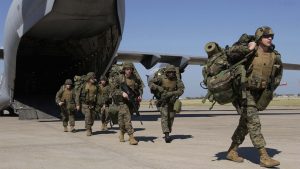Amb. Ryan Crocker was Gen. David Petraeus’ diplomatic partner during the 2007-2008 “surge” in Iraq, and Crocker remains highly regarded for the role that he played then, like reported by kurdistan24.net.
On April 25, speaking at The Atlantic Council, Crocker expressed concern about the vulnerability of US forces in Syria.
“There could be important reasons why we would want to pull our troops out of Syria, once they don’t have an Islamic State (IS) enemy to fight,” he said.
“I keep thinking of the Marines in Lebanon,” Crocker continued. The “same constellation of actors” exists now in Syria, and “the preponderance of force there is not with us.”
The following day, two analysts, speaking at The Hudson Institute, expressed a similar concern.
Jennifer Cafarella is the Senior Intelligence Planner at the Institute for the Study of War. Michael Pregent served as an advisor in Iraq to Petraeus, and then Gen. Ray Odierno, and is now at the Hudson Institute.
Cafarella and Pregent both warned of the vulnerability of US forces in Iraq, as well as Syria.
Cafarella began by noting that Iranian-backed Shia militias have been formally incorporated into the Iraqi security forces.
“The Iranians are deploying Iraqi Shia militias, with Government of Iraq authority, and possibly with weapons provided by the United States, to Syria,” Cafarella said, “to fight on behalf of Bashar al-Asad, and on multiple occasions in the past year to attack American forces,” as she stressed that US troops “are vulnerable.”
Pregent concurred, adding, “These IRGC [Islamic Revolutionary Guard Corps]-Quds Force militias are actually basing around US bases.” The US has “such a small footprint” that “we are hostages.”
Some two weeks after those seminars, on May 8, President Donald Trump affirmed that the US would withdraw from the Iranian nuclear agreement while announcing the reimposition of tough sanctions on Iran.
At a press briefing that day by teleconference from Baghdad, Maj. Gen. Felix Gedney, Deputy Commander for Strategy and Support in the US-led Coalition against IS, was repeatedly asked by journalists if increasing tensions with Iran would negatively affect the Coalition’s mission and, specifically, put Coalition troops at enhanced risk.
Gedney saw little problem, however. “I’m absolutely confident that we can manage the force protection for our troops,” he said in response to a question from Kurdistan 24.
Yet Entifadh Qanbar, an Iraqi-American and President of the Future Foundation in Washington DC, is one more informed voice who disagrees.
Qanbar echoed Pregent as he told Kurdistan 24, “US troops are located in close proximity to the Shia militias. So the militias know of their whereabouts.”
“I think US troops are in great danger,” he continued. “But I don’t think they should pull out of Iraq. They’re necessary to prevent [IS’] reemergence and more generally to maintain stability.”
Qanbar lost a nephew in Iraq—US Army Staff Sergeant, Ahmed Altaie, who was kidnapped in 2006 by an Iranian-backed militia which later killed him. Qanbar understands well the pain of such a loss.
Qanbar had a suggestion. “I think it would be a good idea to move the troops to Kurdistan. The Kurds will have their back.”
“The troops will still be able to maneuver quickly to attack [IS] and do operations, as needed,” he continued, “because most of what remains of IS in Iraq is located along the borders of Kurdistan—in the disputed territories and nearby Sunni areas.”
“But that way, they would be much safer, yet still able to fulfill their mission,” he said.
Of course, short-sighted policies in Washington could inhibit such a move, Qanbar noted. “But if they think that Iraq is ‘one-Iraq,’ then Kurdistan is part of Iraq.”



